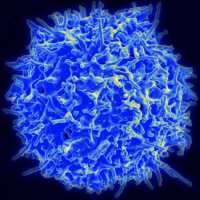Just diagnoses NHL B Cell Mesentery 49 years of age
Hello group,
Unfortunatly I was diagnoses a few weeks ago with NHL B Cell Stage 2 , thankfully this was after my gall bladder went out. Otherwise it would most likely not have been known for a while. I am starting treatment December 17th and 18th. The treatment is Immunal infusion and chemo.
Day 1 Rituxan & Bendomustine 6 to 8 hours.
Day 2 Bendomustine 2 hours.
Treatment is for 6 months on a 28 day
Other than this I am a healthy person, what can i expect from treatment as far as side effects etc. I am very new at this and just started researching this week because of how fast this came on. Any help is appreciated.
TY
Comments
-
Sorry to hear this
Do you know which sub-type it is? They all seem to act differently and many are treated differently. As to side effects in general, your dosage is carefully developed and monitored. If you show serious or unusual side effects, the treatment can be reduced or stopped. There are other options in such a case, but I think you will tolerate this well, since you are healthy to begin with.
Bendamustine and Rituxan are well known and are very likely to have fewer side effects than old line chemo regimens. You may receive some Benadryl before each infusion, as Rituxan is an antibody and may cause an allergic reaction on the part of your immune system. Some people have the reaction and some do not. It is a drug that is used long-term, so less of a concern there.
The Bendamustine is going to priduce more of the typical "chemo" side effects, but is a very effective drug. Used in combination with Rituxan, it is a fairly new combo, and it can affect each patient differently. These are the commonly seen side effects:
- fever, cough, mouth sores, trouble breathing;
- low blood cell counts;
- nausea, vomiting, diarrhea, constipation;
- headache, tiredness;
- rash; or.
- loss of appetite, weight loss.
An interesting bit of history on the Bendamustine. It is called a nitrogen mustard ("mustard" referring only to the aroma of the drug), but has nothing to do with mustard. It is a great grandchild, so to speak, of the mustard gas used in World War I! Examiniations of soldiers who received mustard gas revealed that their blood had very few lymphocytes - thus the idea was born to use it against malignant lymphocytes. Obviously, it is given in far lower dosage than the weaponized form. But, you'll have some bragging rights. Personally, I received three maximum dose infusions of it and had no serious side effects.
0 -
Good afternoon thanks for thepo18guy said:Sorry to hear this
Do you know which sub-type it is? They all seem to act differently and many are treated differently. As to side effects in general, your dosage is carefully developed and monitored. If you show serious or unusual side effects, the treatment can be reduced or stopped. There are other options in such a case, but I think you will tolerate this well, since you are healthy to begin with.
Bendamustine and Rituxan are well known and are very likely to have fewer side effects than old line chemo regimens. You may receive some Benadryl before each infusion, as Rituxan is an antibody and may cause an allergic reaction on the part of your immune system. Some people have the reaction and some do not. It is a drug that is used long-term, so less of a concern there.
The Bendamustine is going to priduce more of the typical "chemo" side effects, but is a very effective drug. Used in combination with Rituxan, it is a fairly new combo, and it can affect each patient differently. These are the commonly seen side effects:
- fever, cough, mouth sores, trouble breathing;
- low blood cell counts;
- nausea, vomiting, diarrhea, constipation;
- headache, tiredness;
- rash; or.
- loss of appetite, weight loss.
An interesting bit of history on the Bendamustine. It is called a nitrogen mustard ("mustard" referring only to the aroma of the drug), but has nothing to do with mustard. It is a great grandchild, so to speak, of the mustard gas used in World War I! Examiniations of soldiers who received mustard gas revealed that their blood had very few lymphocytes - thus the idea was born to use it against malignant lymphocytes. Obviously, it is given in far lower dosage than the weaponized form. But, you'll have some bragging rights. Personally, I received three maximum dose infusions of it and had no serious side effects.
Good afternoon thanks for the reply and the information. I am very prone to mouth sores already so Im concerned about those. Ive read that having ice chips and water during the process may help that. I dont know the sub type that your are referring too.
Follicular was part of my dianosis. Is that what you mean by subtype?
0
Discussion Boards
- All Discussion Boards
- 6 CSN Information
- 6 Welcome to CSN
- 121.6K Cancer specific
- 2.8K Anal Cancer
- 446 Bladder Cancer
- 308 Bone Cancers
- 1.6K Brain Cancer
- 28.5K Breast Cancer
- 395 Childhood Cancers
- 27.9K Colorectal Cancer
- 4.6K Esophageal Cancer
- 1.2K Gynecological Cancers (other than ovarian and uterine)
- 13K Head and Neck Cancer
- 6.3K Kidney Cancer
- 671 Leukemia
- 791 Liver Cancer
- 4.1K Lung Cancer
- 5.1K Lymphoma (Hodgkin and Non-Hodgkin)
- 235 Multiple Myeloma
- 7.1K Ovarian Cancer
- 56 Pancreatic Cancer
- 487 Peritoneal Cancer
- 5.4K Prostate Cancer
- 1.2K Rare and Other Cancers
- 534 Sarcoma
- 719 Skin Cancer
- 647 Stomach Cancer
- 190 Testicular Cancer
- 1.5K Thyroid Cancer
- 5.9K Uterine/Endometrial Cancer
- 6.3K Lifestyle Discussion Boards
